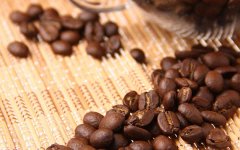The origin of selected coffee what is the origin of selected coffee? Selection of coffee
In an exclusive interview with Tea and Coffee in 1974, Erna Knutsen was the first to use the term "Specialty Coffee" to describe premium coffee beans with excellent flavor, which is different from commercial coffee (Commercial Coffee), which focuses only on marketing rather than quality.

The United States is the world's largest consumer of coffee. At that time, the market was dominated by commercial coffee, and Americans grew bored because of their poor flavor. Nusen's call to the top has undoubtedly established the trend status of selected coffee.
Nusen, who immigrated to the United States from Norway as a child, did not come into contact with coffee until he was in his 40s, first as an executive secretary at a coffee company in San Francisco (B.C. Ireland). At that time, she found that the company's imported robusta beans were sold in large quantities to well-known General Foods (General Foods) and Sears Brothers (Hills Bros.) The company. These companies mainly deal in commercial coffee, mixing robusta beans into products to make bottled or instant coffee, which is then marketed throughout the United States with intensive advertising.
At that time, although the company also imported high-quality Arabica beans, but the demand was pitifully small, usually less than one container (about 250bags, or 15000 kilograms). Nusen tried to sell these high-quality beans to local small roasters, and the results were quite smooth, showing that regional coffee makers pay more attention to flavor and have a group of coffee confidants. Nusen went on to promote a selection of coffee with a small number of transactions, achieving extraordinary success, and finally even ascended to the throne of president.
Nusen has won the Lifetime contribution Award (Lifetime Contribution Award) from the American selected Coffee Association (SCAA) and serves as a director of the Association. In 1986, she founded the Nusen Coffee Company (Knutsen Coffee Ltd.), located in Sacramento, California, with a high position in the selection coffee market.
Important Notice :
前街咖啡 FrontStreet Coffee has moved to new addredd:
FrontStreet Coffee Address: 315,Donghua East Road,GuangZhou
Tel:020 38364473
- Prev

An introduction to the origin of coffee-- characteristics of Ethiopian coffee taste
Ethiopia is the hometown of Arabica coffee, and it is in the forests of Kaffa that you can see wild Arabica coffee. In Ethiopian, coffee is called Bun or Buna, and coffee beans (coffeebean) may be translated from Kaffa Bun. Arabica coffee was discovered early in the Harald area, probably from Kafa.
- Next

Introduction to boutique coffee beans-Arabica coffee beans what are Arabica coffee beans? Ah
What is Arabica coffee beans? Arabica coffee beans are also one of the coffee beans, but account for 70% and 80% of coffee bean production. It can be seen that Arabica coffee beans are the main source of raw materials for coffee. So what is Arakabi? What kind of nutrition does it have? What's the use? How does it make coffee? What if I eat expired Arabica coffee beans?
Related
- Detailed explanation of Jadeite planting Land in Panamanian Jadeite Manor introduction to the grading system of Jadeite competitive bidding, Red bid, Green bid and Rose Summer
- Story of Coffee planting in Brenka region of Costa Rica Stonehenge Manor anaerobic heavy honey treatment of flavor mouth
- What's on the barrel of Blue Mountain Coffee beans?
- Can American coffee also pull flowers? How to use hot American style to pull out a good-looking pattern?
- Can you make a cold extract with coffee beans? What is the right proportion for cold-extracted coffee formula?
- Indonesian PWN Gold Mandrine Coffee Origin Features Flavor How to Chong? Mandolin coffee is American.
- A brief introduction to the flavor characteristics of Brazilian yellow bourbon coffee beans
- What is the effect of different water quality on the flavor of cold-extracted coffee? What kind of water is best for brewing coffee?
- Why do you think of Rose Summer whenever you mention Panamanian coffee?
- Introduction to the characteristics of authentic blue mountain coffee bean producing areas? What is the CIB Coffee Authority in Jamaica?

